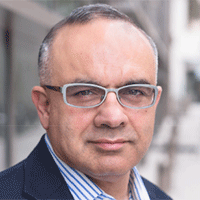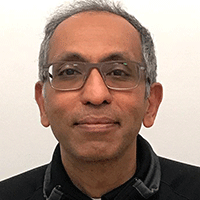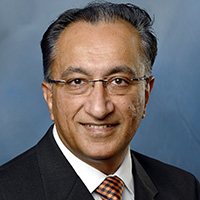Insights from InterPACK 2024 Panels, Tutorials and Workshops
Date: October 9, 11:00am – 12:15pm Pacific Time
Location: California-Salon-K, Holiday Inn San Jose – Silicon Valley
Chair: Gamal Refai-Ahmed, AMD
Speakers:
- Dr. Pushkar P. Apte, SEMI
- Dr. Bahgat Sammakia, Binghamton University
- Dr. Suresh Ramalingam, AMD
- Dr. Pradeep Lall, Auburn University
Abstract: A special panel on "Silicon/Packaging Technology Development to Enable the Next Generation of AI," where distinguished executive leaders from industry and academia will explore the forefront of advancements revolutionizing AI hardware. This panel will reveal an exciting deep dive into the latest silicon and packaging innovations, examining how these technologies are transforming AI performance and efficiency. The expert panelists will unravel the complexities of advanced packaging techniques like 2.5D and 3D stacking, highlighting their critical role in overcoming challenges related to heat dissipation and signal integrity. Discover the importance of heterogeneous integration, the cutting-edge thermal management solutions, and the evolving role of materials science in semiconductor packaging. Engage with insights on how the industry is addressing higher interconnect density demands, the potential of silicon photonics, and the strategies balancing performance, power consumption, and cost in AI chip packaging. Additionally, the panel will explore the implications of a potential advancements, the role of machine learning in packaging optimization, and the significance of academia-industry collaboration in pushing technological boundaries. This panel is set to ignite audience curiosity and provide a comprehensive overview of the emerging technologies poised to disrupt the AI hardware landscape in the coming years. Don't miss this opportunity to gain invaluable knowledge and foresight from the leaders driving the future of AI technology.

Dr. Pushkar P. Apte serves as Strategic Technology Advisor and leads the Global Data & Artificial Intelligence (AI) Initiative at SEMI, the electronics industry consortium representing 3300+ companies worldwide. His work focuses on two exciting opportunities at the intersection of semiconductors and AI–innovative, system-level solutions to accelerate innovation in AI, and digital twins to improve efficiency of semiconductor research & development, design and manufacturing.
Dr. Apte received his Master's and Ph.D. degrees from Stanford University in Materials Science and Electrical Engineering, and his Bachelor's degree in Ceramic Engineering from the Indian Institute of Technology, Varanasi, India. Dr. Apte also holds an Executive M.B.A. from Southern Methodist University.
Until June 2024, Dr. Apte served as Director of Strategic Initiatives at the University of California, Berkeley, where he built industry-academic partnerships to create intelligent technology solutions for challenging business and societal applications. Previously, Dr. Apte has worked with Texas Instruments Incorporated on cutting-edge research and technology development for semiconductors, with McKinsey & Company as their Global Semiconductor Business Expert, and with the Semiconductor Industry Association as Vice President of Technology. Dr. Apte has served on the Executive Boards of the Semiconductor Research Corporation, International SEMATECH, and the International Technology Roadmap for Semiconductors.
Dr. Apte has over 50 publications and presentations in prestigious international journals, conferences, and institutions, including several Invited Papers. He has received the Norman Hackerman Young Author Award from the Electrochemical Society for Best Paper in the Journal of the Electrochemical Society, and the Graduate Student Award from the Materials Research Society for Outstanding Research Performance. Dr. Apte also holds 2 U.S. Patents.

Dr. Bahgat Sammakia is the vice president for research at Binghamton University and director of the NSF-IUCRC on Energy Smart Electronic Systems (ES2) and Binghamton University’s Small Scale Systems Integration and Packaging Center (S³IP), a New York State Center of Excellence. He is a professor of mechanical engineering in the Thomas J. Watson School of Engineering and Applied Science.
Dr. Sammakia has spent much of his research career working to improve thermal management strategies in electronic packaging systems at multiple scales ranging from devices to entire Data Centers.
Dr. Sammakia joined the faculty of the Watson School in 1998 following a fourteen-year career at IBM where he worked in the area of research and development of organic electronic systems. He has contributed to several books on natural convection heat transfer and is also the principal investigator or co-principal investigator on several cross-disciplinary research projects.
Dr. Sammakia earned his bachelor's degree in mechanical engineering from the University of Alexandria, Egypt, and his master's and doctorate in mechanical engineering from the State University of New York at Buffalo. He was a post-doctoral fellow at the University of Pennsylvania. Dr. Sammakia has over 200 published papers in refereed journals and conference proceedings, has contributed to several books in the areas of heat transfer and electronics packaging. He also holds 18 US patents and 12 IBM technical disclosures in the area of electronics packaging. Dr. Sammakia was the General Chair for the ITherm 2006 conference and the Interpack 2012 Conference. Dr. Sammakia is a Fellow of both the IEEE and the ASME and is the editor of the Journal of Electronic Packaging, Transactions of the ASME and an associate editor of the CPMT Transactions of the IEEE.

Dr. Suresh Ramalingam is a Corporate Fellow at AMD, where he leads the Advanced Packaging & Thermo-Mechanical Technologies sector. With a Ph.D. and M.S. in Chemical Engineering from MIT, and a B.Tech from IIT Madras, his extensive education has laid the foundation for over two decades of significant contributions in the semiconductor industry. Dr. Ramalingam's career began at Intel Corporation, where from 1994 to 2000, he developed advanced interconnect technologies and managed optical materials engineering. As a co-founder and Director of Materials at Scion Photonics from 2000 to 2002, he pioneered fiber-optic technologies until its acquisition by JDS Uniphase, where he then served as Senior Engineering Manager until 2004. His tenure at Xilinx from 2004 to 2022 saw him spearheading advanced packaging solutions for FPGAs, impacting 28nm technology developments significantly. Since 2022, at AMD, he focuses on enhancing silicon performance through innovative packaging and reliability improvements. Dr. Ramalingam has been recognized with numerous awards, including the ECTC 2011 Outstanding Session Paper and multiple keynote honors at prestigious IEEE conferences and other technical symposia worldwide, reflecting his leadership in integrating academic insights with industry applications to drive forward next-generation semiconductor technologies.

Dr. Pradeep Lall is the MacFarlane Endowed Distinguished Professor and Alumni Professor with the Samuel Ginn College of Engineering and Director of the Auburn University Electronics Research Institute. He holds Joint Courtesy Appointments in the Department of Electrical and Computer Engineering and the Department of Finance. He is a member of the technical council and academic co-lead of automotive and asset monitoring TWGs of NextFlex Manufacturing Institute. He is the author and co-author of 2-books, 15 book chapters, and over 975 journal and conference papers in the field of semiconductor packaging, electronics reliability, manufacturing, safety, testing, energy efficiency, and survivability. Dr. Lall is a fellow of the ASME, a fellow of the IEEE, a fellow of the NextFlex National Manufacturing Institute, and a fellow of the Alabama Academy of Science. He is recipient of the SEMI R&D Achievements Award for landmark contributions to Additive Printed Electronics, ASME Avram Bar-Cohen Memorial Medal, IEEE Biedenbach Outstanding Engineering Educator Award, Auburn University Research Advisory Board’s Advancement of Research and Scholarship Achievement Award, IEEE Sustained Outstanding Technical Contributions Award, NSF-IUCRC Association’s Alex Schwarzkopf Award, Alabama Academy of Science Wright A, Gardner Award, IEEE Exceptional Technical Achievement Award, ASME-EPPD Applied Mechanics Award, SMTA’s Member of Technical Distinction Award, Auburn University’s Creative Research and Scholarship Award, SEC Faculty Achievement Award, Samuel Ginn College of Engineering Senior Faculty Research Award, Three-Motorola Outstanding Innovation Awards, Five-Motorola Engineering Awards, and over Fifty Best-Paper Awards at national and international conferences. Dr. Lall has served in several distinguished roles at the national and international level including serving as a member of the National Academies Committee on Electronic Vehicle Controls, Member of the IEEE Reliability Society AdCom, IEEE Reliability Society Representative on the IEEE-USA Government Relations Council for R&D Policy, Chair of Congress Steering Committee for the ASME Congress, Member of the technical committee of the European Simulation Conference EuroSIME, Associate Editor for the IEEE Access Journal, and Associate Editor for the IEEE Transactions on Components and Packaging Technologies. Dr. Lall is the founding faculty advisor for the SMTA student chapter at Auburn University and a member of the editorial advisory board for SMTA Journal. He received the M.S. and Ph.D. degrees in Mechanical Engineering from the University of Maryland and the M.B.A. from the Kellogg School of Management at Northwestern University.